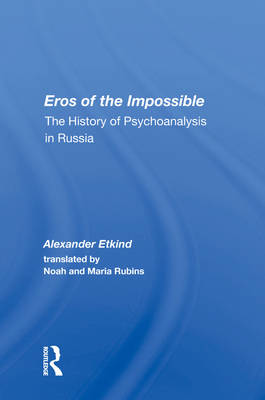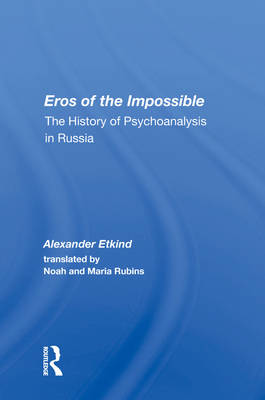
- Afhalen na 1 uur in een winkel met voorraad
- Gratis thuislevering in België vanaf € 30
- Ruim aanbod met 7 miljoen producten
- Afhalen na 1 uur in een winkel met voorraad
- Gratis thuislevering in België vanaf € 30
- Ruim aanbod met 7 miljoen producten
Zoeken
€ 195,95
+ 391 punten
Uitvoering
Omschrijving
Marxism was not the only Western idea to influence the course of Russian history. In the early decades of this century, psychoanalysis was one of the most important components of Russian intellectual life. Freud himself, writing in 1912, said that "in Russia, there seems to be a veritable epidemic of psychoanalysis." But until Alexander Etkind's Eros of the Impossible, the hidden history of Russian involvement in psychoanalysis has gone largely unnoticed and untold. The early twentieth century was a time when the craving of Russian intellectuals for world culture found a natural outlet in extended sojourns in the West, linking some of the most creative Russian personalities of the day with the best universities, salons, and clinics of Germany, Austria, France, and Switzerland. These ambassadors of the Russian intelligentsia were also Freud's patients, students, and collaborators. They exerted a powerful influence on the formative phase of psychoanalysis throughout Europe, and they carried their ideas back to a receptive Russian culture teeming with new ideas and full of hopes of self-transformation. Fascinated by the potential of psychoanalysis to remake the human personality in the socialist mold, Trotsky and a handful of other Russian leaders sponsored an early form of Soviet psychiatry. But, as the Revolution began to ossify into Stalinism, the early promise of a uniquely Russian approach to psychoanalysis was cut short. An early attempt to merge medicine and politics forms final chapters of Etkind's tale, the telling of which has been made possible by the undoing of the Soviet system. The effervescent Russian contribution to modern psychoanalysis has gone unrecognized too long, but Eros of the Impossible restores this fascinating story to its rightful place in history.
Specificaties
Betrokkenen
- Auteur(s):
- Uitgeverij:
Inhoud
- Aantal bladzijden:
- 416
- Taal:
- Engels
Eigenschappen
- Productcode (EAN):
- 9780367010256
- Verschijningsdatum:
- 7/06/2019
- Uitvoering:
- Hardcover
- Formaat:
- Genaaid
- Afmetingen:
- 152 mm x 229 mm
- Gewicht:
- 699 g

Alleen bij Standaard Boekhandel
+ 391 punten op je klantenkaart van Standaard Boekhandel
Beoordelingen
We publiceren alleen reviews die voldoen aan de voorwaarden voor reviews. Bekijk onze voorwaarden voor reviews.











